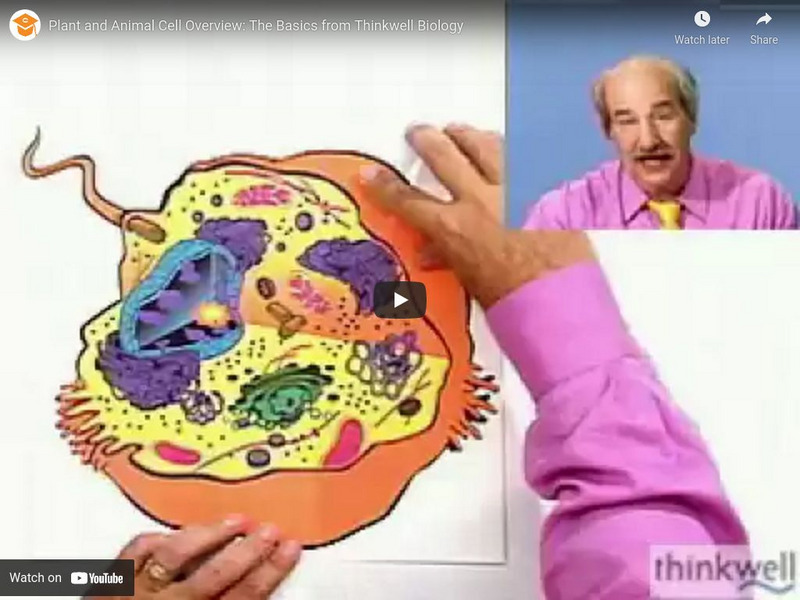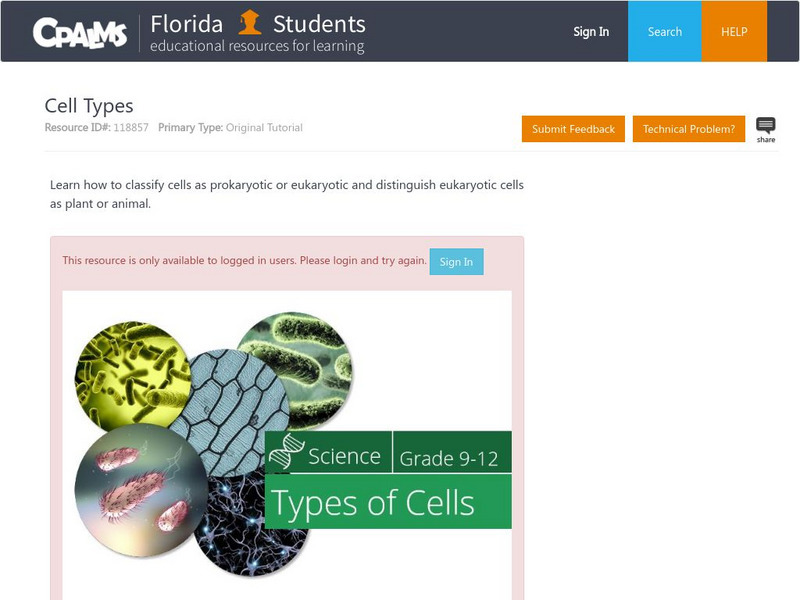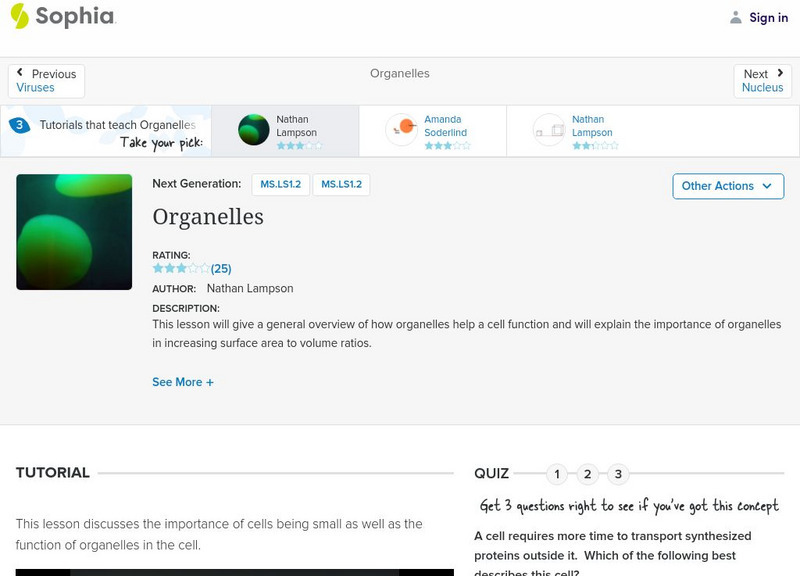Massachusetts Institute of Technology
Mit: Blossoms: Antioxidant Enzymes: Three or Four Veggies a Day Keeps Aging Away
The purpose of this video lesson is to expand the student's knowledge about enzymes by introducing the antioxidant enzymes that are intimately involved in the prevention of cellular damage and eventual slowing of the aging process and...
Eastern Kentucky University
Eastern Kentucky University: Human Physiology: Cell Structure and Function
Extensive biology course material on cell structure and function, that is enriched with videos and images to demonstrate the processes being explained.
Khan Academy
Khan Academy: Structure of a Cell: Introduction to Cells: Scales of Cells
This video tries to conceptualize the size of cells. [7:19]
Khan Academy
Khan Academy: Overview of Cell Signaling
Overview of cell signaling, the different ways that cells communicate with each other. Explores autocrine, paracrine, and endocrine signaling. [8:48]
Other
Thinkwell Video Biology: Plant and Animal Cell Overview: The Basics
A sometimes humorous look at plant and animal eukaryotic cells. Learn about specialization and compartmentalization in cell biology through this YouTube video. [9:16]
Other
Bio Visions: The Inner Life of a Cell
Go inside the fascinating world of the living cell. Learn about the complex functions of each organelle, and how they all work together to help the cell stay alive. [8:12]
CPALMS
Florida State University Cpalms: Florida Students: Cell Types
A tutorial addresses eukaryotes and prokaryotes and reviews their structures and functions.
University of Utah
University of Utah: learn.genetics: The Flight or Fight Response
In this step-by-step portrayal discover how cellular communication causes physiological changes during the fight or flight response. In addition to viewing the video, read the scene-by-scene guide to learn what happens when the brain...
Khan Academy
Khan Academy: Overview of Animal and Plant Cells
Video lesson provides an overview of animal and plant cells while covering cell walls, vacuoles, chloroplasts, peroxisomes, lysosomes, mitochondria, etc. [8:41]
Khan Academy
Khan Academy: Heart Muscle Contraction: Sympathetic Nerves Affect Myosin
Check out how the amount of Myosin that is tugging on your heart can change depending on your activity level. Rishi is a pediatric infectious disease physician and works at Khan Academy. [12:02]
Sophia Learning
Sophia: Eukaryotic vs. Prokaryotic Cells
An introduction to the structure of two different types of cells: eukaryotic and prokaryotic cells. [2:14]
Howard Hughes Medical Institute
Hhmi: Bio Interactive: Zebrafish Heart Regeneration
The zebrafish heart is similar to the human heart in many respects. But unlike the human heart, the fish heart closes wounds rapidly and then regenerates to nearly full function. Fibroblast growth factor (FGF) is an important molecule in...
CK-12 Foundation
Ck 12: Plant Cell Structures: Parts of a Plant Cell
[Free Registration/Login may be required to access all resource tools.] Take a tour of a plant cell and see how they differ from animal cells. Also take a look at the unique characteristics that some plants have. [2:57]
Bozeman Science
Bozeman Science: Cellular Specialization
Paul Andersen explains how cells differentiate to become tissue specific. He also explains the role of transcription factors in gene regulation. The location of a cell within the blastula ultimately determines its fate. The SrY gene is...
Khan Academy
Khan Academy: Cells: Scale of Cells
Thinking about how large a cell is compared to viruses, proteins and simple molecules. [7:19]
Khan Academy
Khan Academy: Water Potential Example
This worked example by Sal Khan calculates the water potential of potato squares based on placing them in various concentrations of sucrose solutions. [6:44]
Crash Course
Crash Course Biology #6: Plant Cells
Hank describes why plants are so freaking amazing - discussing their evolution, and how their cells are both similar to & different from animal cells. [10:28]
Science Friday Initiative
Science Friday: Quicker Recipe for Turning Skin Cells Into Heart Cells
Researchers say they have turned mouse skin cells directly into beating heart cells.
Sophia Learning
Sophia: Organelles: Lesson 1
This lesson will give a general overview of how organelles help a cell function and will explain the importance of organelles in increasing surface area to volume ratios. It is 1 of 3 in the series titled "Organelles."
Bozeman Science
Bozeman Science: Compartmentalization
Paul Andersen explains how eukaryotic cells use compartmentalization to increase the surface area and level of specialization within the cell. Prokaryotic and eukaryotic cells are compared and contrasted. The role of both the mitochodria...
Bozeman Science
Bozeman Science: Cell Communication
Paul Andersen discusses cell communication. He begins by explaining how he communicates with other individuals using various forms of electronic communication. He then explains how cells communicate when the distance between them is big,...
Bozeman Science
Bozeman Science: Cellular Specialization
Paul Andersen explains how cells differentiate to become tissue specific. He also explains the role of transcription factors in gene regulation. The location of a cell within the blastula ultimately determines its fate. The SrY gene is...
Bozeman Science
Bozeman Science: Cellular Variation
Paul Andersen explains how variation is created within a cell. He starts by showing how molecular variation can increase fitness at the local level. He explains how an additional chlorophyll molecule allows plants to absorb more light...






















